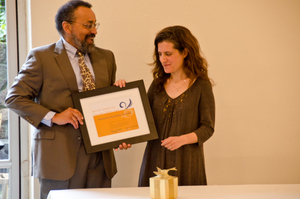
By Andrew Cohen
Professor Anne Joseph O’Connell is the latest recipient of Berkeley Law’s annual Rutter Award for Teaching Distinction. Established in 1995 by the late William Rutter—a philanthropist, lawyer, educator, and author—the award honors a professor who has shown an outstanding commitment to teaching, and who is an inspiration to students.
A highly recognized scholar and a Berkeley Law faculty member since 2004, O’Connell teaches administrative law and civil procedure. She freely admits that her classroom approach has changed in recent years.
“I’ve shifted from thinking of teaching as mostly imparting some set of knowledge about the law to mostly developing students’ interest and analytical skills,” O’Connell said. “In comparison to undergraduate teaching I’ve done, law school teaching is more about a conversation among students—and between me and them. The students here definitely participate more than my classmates did when I was in law school, which I really enjoy.”
While O’Connell’s teaching style and philosophy have evolved, so too has her audience.
“When I first went to law school my class was around 40 percent female,” she said. “Now, when I look out in a large classroom here, over half the students are women. And they contribute in wonderfully interesting ways to the discussion. That gender balance is just one highlight of teaching here.”
A national expert on the inner workings of government, O’Connell has written extensively about federal agencies. Her publications have appeared in the American Political Science Review, California Law Review, and law reviews at several other top schools, including the University of Chicago, Northwestern, Penn, Southern California, and Virginia.
O’Connell’s article, “Vacant Offices,” won the American Bar Association’s Scholarship Award in Administrative Law for the best article or book published in 2009. “Political Cycles of Rulemaking” won the Association of American Law Schools’ 2007-2008 Scholarly Papers Competition for faculty members with fewer than five years of legal teaching. In 2006, she received an award from the Hellman Family Faculty Fund, which is given annually to “promising assistant professors who show capacity for great distinction in their research.”
These days, O’Connell is working with University of Pittsburgh professor George Krause to explore the loyalty and competence of federal agency officials from the past five administrations. Their project will analyze implications for the officials’ careers and for the performance of their agencies.
Before coming to Berkeley Law, O’Connell clerked for Justice Ruth Bader Ginsburg of the U.S. Supreme Court during the October 2003 term. She was also a trial attorney for the Federal Programs Branch of the U.S. Department of Justice’s Civil Division from 2001–2003, and clerked for Judge Stephen F. Williams of the U.S. Court of Appeals for the D.C. Circuit from 2000–2001.
O’Connell credits the mentorship of fellow Berkeley Law professor Eleanor Swift “for playing an important role in helping me develop as a teacher.” She added that law-school colleagues such as Kenneth Bamberger, who began teaching a year after she did, “have been great resources.”